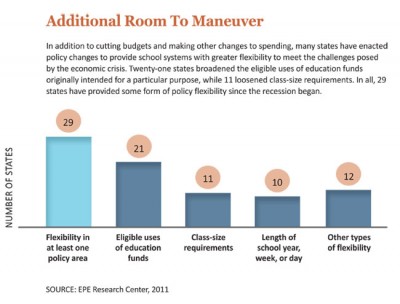Today, Education Week released its annual Quality Counts report, a treasure trove of articles, charts and graphics that in 2011 focus on how the Great Recession has affected public education in the U.S.
The report issues letter grades to all 50 states and Washington, D.C. based on multiple metrics, including K-12 Achievement, School Finance, Transitions and Alignment and Chance-for-Success (the last of which “captures the importance of education in a person’s lifetime from cradle to career,” according to the report).
The nation as a whole earned a C, while Maryland won top honors — as it did in 2009 and 2010 — with a B+. Not far behind were Massachusetts and New York, both of which earned Bs. At the very bottom of the list, each earning a D+, were South Dakota, Washington, D.C. and Nebraska.
With regard to the recession, the report’s authors note that 52 percent of all jobs saved or created by the American Revcovery and Reinvestment Act (ARRA) — also known as the federal stimulus — were in the field of education. The map above pinpoints the locations of these 337,000 education-related jobs.
Among the more interesting findings of the report are those related to how states have responded to their budget crises:
- “Since the recession began, 29 states have enacted policies that offer local school systems some form of flexibility to meet the challenges posed by the economic crisis.
- “Twenty-one states have broadened the eligible uses of education funds originally intended for a particular purpose. In 11 states, class-size requirements have been loosened; 10 states have offered the option of modifying the length of the school year, week, or day as a way to cut costs.
- “Only three states have waived protections on K-12 education funding since the start of the recession.”
In an article entitled “Personnel Costs Prove Tough to Contain,” Sean Cavanagh details pension shortfalls plaguing states in general — and especially California, which has unfunded liability to the tune of $40 billion. Cavanagh notes that “California’s entire budget for fiscal 2011, by comparison, is $87.5 billion.”
In the same piece, Cavanagh looks at a performance-pay plan in Colorado Springs that hasn’t received much media attention, at least compared to other performance-pay schemes in places like Denver and Washington, D.C.
Colorado’s Harrison School District Two, which serves 11,000 students, introduced the plan — which “links teachers’ salaries to their ability to raise student performance, classroom observations, and other factors” — last fall.
Cavanagh reports, “The Harrison district, which has an annual general-fund budget of $80 million, gave about 75 percent of its teachers an initial salary boost at the beginning of the school year when they were placed on the new performance scale for the first time. The district estimates that only about 20 percent of teachers will be given raises based on their performance this academic year, and that the remaining 80 percent will have their salaries frozen, though those numbers could change, Superintendent Mike Miles says.
“The Harrison district does not give automatic pay increases, or stipends for advanced degrees. It also does not provide extra pay for teachers’ service as mentors, and it saves considerable money by not paying educators extra to serve as department chairs or team leaders; the district regards those duties as professional responsibilities, Miles says.
“The district spent about $1.2 million to create the performance-pay system, with $800,000 coming from a foundation grant, Miles says. But after that initial expense,he believes the system will be revenue-neutral. He also says other districts, including larger ones, could replicate pay models like Harrison’s without incurring new costs, though he thinks the primary motivation for such plans is to recruit new teaching talent and raise student achievement.”
This sounds like an experiment well worth watching. And in the coming weeks, be on the lookout for a new “Go Deep” section from The Hechinger Report devoted entirely to the issue of teacher compensation.
Congratulations to Cavanagh and the entire Ed Week team on a first-rate report!





